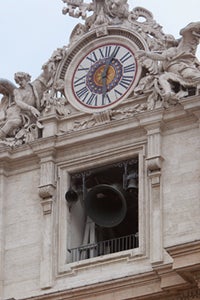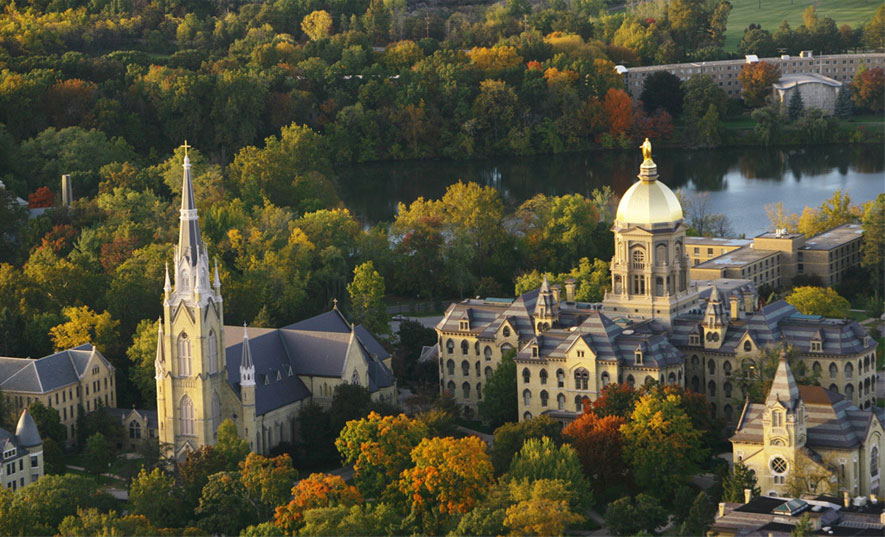 Due to many scheduling conflicts a few Sundays back, I went to Mass by myself without the wife and kids. Over the past month or so we began to notice a curious and regular disruption at the 9:30 a.m. Mass. The weird part was, I began to take a strange pleasure in it. It went something like this:
Due to many scheduling conflicts a few Sundays back, I went to Mass by myself without the wife and kids. Over the past month or so we began to notice a curious and regular disruption at the 9:30 a.m. Mass. The weird part was, I began to take a strange pleasure in it. It went something like this:
Priest prays out loud, "May the Lord accept the sacrifice at your ha-"
"YES LORD," interjects the affirmation from what sounds like an old African-American woman somewhere in the pews to the far back and right.
And it continues...
"For the praise and glory of your name..."
"YES LORD."
"For our-"
"YES."
"-good and the good-"
"YES."
"-of all our Church."
"YES LORD."
And it goes on and on like that, with the older lady interceding between every ten or so words from the Priest. Heads everywhere are trying to make clandestine surveillance of the pews around them without making it obvious that they are clearly distracted and pissed off.
Now I'm not going to lie, the first time my wife and I heard the Yes Lady we did what every other couple did. We looked at each other with faces of smirky inconvenience and gossiped after Mass about how obnoxious and distracting this woman was being, resolving that SOMEONE had to do SOMETHING.
I mean holy righteous anger batman! We are trying to PRAY here!
But this Sunday was different. Right around the Eucharistic prayer I noticed a small but steaming pile of self-righteous indignation in my pew. Curious, I kicked it up under the pew in front of me and listened again to the Yes Lady.
"Make holy, therefore, these gifts, we pray, by sending down your Spirit upon them like the dewfall, so that they may become for us the Body and Blood of our Lord, Jesus Christ."
"YES."
A quick burst of willful naivete shot through my brain and I asked a question based on giving the Yes Lady the benefit of the doubt:
What if she really believes she is doing something important?
Suddenly I felt angry. I was angry at anyone who was angry at the Yes Lady. I was angry at the 59% of U.S. Catholics who don't attend Mass weekly. I was angry at the 62% of U.S. Catholics who don't claim a strong religious identity. I was angry at the 29% of U.S. Catholics who don't believe in a personal God. But most of the anger was aimed at myself, because I suddenly became ashamed that I felt so entitled to a distraction free Mass.
What do Catholics who leave the Church to join a Protestant denomination say one of their biggest reasons for leaving is? "My spiritual needs are not being met."
DISCLAIMER: There is a big conversation we could have about the discrepancy between a person's perception of not being spiritually fed, and the actual reality of the depth of spiritual fullness made available in the Catholic Church. And I could fill a hard drive with reasons why I don't think anyone should be constantly giving their public verbal consent to the Eucharistic Prayer. I'm not saying active participation must be busy participation.
But do we, who know the sublime reality of Mass, worship like we are being spiritually fed?
As I honestly examined my frustration with the Yes Lady, I realized I was really just frustrated by the notion of anything "happening" at Mass.
I watched the Priest raising up our gifts and the work of our hands - the bread, the wine, and all intentions we lay at the altar - but part of me didn't really expect God to accept them. I heard the Priest calling the Holy Spirit down on the altar with the conviction of Elijah, but part of me would have been inconvenienced by a rush of wind and tongues of fire. I heard the Priest imploring the help and intercession of an army of Saints, but part of me didn't really want them to show up. I cried aloud telling the Lord I'm not worthy for him to enter under my roof, begging Him to only say the word and heal me, but part of me didn't believe He could actually deny me. I waited mere minutes as we shuffled to the front of the Church to hold the endless, to consume the unconsumable, to swallow the sea, to insert infinite love into my size 34 waist, like a candle trying to hold the Sun, but part of me would be impatient if anyone took longer than seconds to take their wafer and move on.
Who is really being inconvenienced here anyways? Me? The guy who wanted a woman with expectant faith to shutup so I could go back to thinking my own thoughts during Mass?
Or God, who sits through Mass revealing Himself lovingly through His Son, humbly through bread and wine, vulnerably through His death on a Cross, and intimately through bodily communion, only for people like me to look on with blank stares like we're checking email? I've sent prayers to God soaked in tears asking Him to stop being so distant, and the next day been so impatient with a Priest who fumbled slowly through the Mass you would have thought if God himself showed up I'd tell Him to keep His homily short.
Thank God for the Yes Lady. I think only Yes Ladies get healed by Jesus. I think Yes Ladies walk out to Jesus on the water. I think the upper room was full of Yes Ladies at Pentecost. I think Yes Ladies' prayers heal the sick. I think Yes Ladies convert cities. I think only Yes Ladies can be tortured and martyred for Christ.
Is this a call for everyone to go all Southern Baptist this Sunday at their local parish? No. Please no.
But lets smile at the Yes Lady.
Because thanks to her, I pray more often for God to show up.
I pray more often for liturgical inconveniences.
(Photo by Cameron Zohoori)

 St. John of the Cross Statue by Magdeleine Weerts
St. John of the Cross Statue by Magdeleine Weerts




 I'm excited to see that the University of Notre Dame is finally being a little more inclusive and less judgmental and intolerant.
I'm excited to see that the University of Notre Dame is finally being a little more inclusive and less judgmental and intolerant.